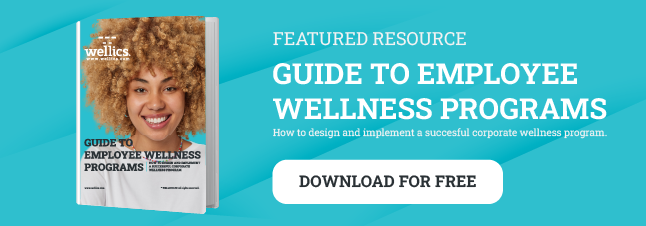In today's modern workforce, employees are facing increasing levels of stress and competition in the workplace, which can often lead to sleep issues. Poor sleep hygiene can have a significant impact on overall health and wellbeing, as well as job performance. Employers who take a proactive approach to promoting healthy sleep habits among their employees can help to improve productivity and overall workplace dynamics. In this article we are going to explore how nutrition affects good nights sleep and employee wellness.
Nutrition and sleep are two of the five key factors that affect well-being. Proper nutrition is essential for overall health and wellbeing, and can play a key role in promoting healthy sleep habits. Certain foods contain nutrients that can help to regulate sleep patterns and promote restful sleep.
Choosing The Right Foods For A Good Night's Sleep
One key nutrient that is important for promoting good sleep is tryptophan, an amino acid that is converted into serotonin and then melatonin in the body. Melatonin is a hormone that helps to regulate our sleep-wake cycle, and increasing levels of melatonin in the body can help to promote restful sleep.
Tryptophan is found in a variety of foods, including poultry, fish, eggs, dairy products, nuts, and seeds. Incorporating these foods into our diets can help to increase our intake of tryptophan and promote better sleep.
In addition to tryptophan, other nutrients that are important for promoting healthy sleep include magnesium and calcium. Magnesium helps to promote relaxation and can be found in foods like leafy green vegetables, whole grains, and nuts. Calcium is important for regulating the body's production of melatonin and can be found in dairy products, leafy green vegetables, and fortified cereals.
On the other hand, there are certain foods that can disrupt sleep and should be avoided or consumed in moderation. Caffeine is a stimulant that can interfere with sleep, so it is best to avoid caffeine-containing foods and beverages in the hours leading up to bedtime. Foods that are high in sugar or fat can also disrupt sleep by causing fluctuations in blood sugar levels and promoting wakefulness.
The 10 Best And Worst Foods For Healthy Sleep
These are the 10 best and worst foods for healthy sleep, so you can make informed decisions about what to eat before bedtime. Whether you're looking for foods that promote relaxation and restfulness, or trying to avoid those that disrupt your sleep patterns, we got you covered.
The Best Foods for Sleep:
- Warm Milk: Warm milk has long been used as a sleep aid due to its high tryptophan content, an amino acid that helps produce serotonin and melatonin, which can help promote sleep.
- Almonds: Almonds are an excellent source of magnesium, a mineral that can help relax muscles and calm the body before sleep.
- Cherries: Cherries contain melatonin, a hormone that helps regulate sleep-wake cycles. Eating cherries or drinking cherry juice before bed can help improve sleep quality.
- Bananas: Bananas are an excellent source of potassium, which can help regulate sleep patterns. They also contain tryptophan and magnesium, which can help promote relaxation.
- Whole Grains: Whole grains such as oatmeal, brown rice, and whole-wheat bread are rich in complex carbohydrates that can help promote sleep. They also contain tryptophan, which can help produce melatonin.
The Worst Foods for Sleep:
- Caffeine: Caffeine is a stimulant that can keep you awake and disrupt sleep patterns. Avoid consuming caffeine at least six hours before bedtime.
- Alcohol: While alcohol can help you fall asleep faster, it can disrupt the sleep cycle, causing you to wake up more frequently during the night.
- Spicy Foods: Spicy foods can cause heartburn and indigestion, making it difficult to fall asleep and stay asleep.
- Fatty Foods: High-fat meals can take longer to digest, which can cause discomfort and disrupt sleep.
- Sugary Foods: Sugary foods can cause a spike in blood sugar levels, leading to a crash later on that can disrupt sleep patterns.
How Employers Can Support Their Employees' Wellbeing Through Sleep and Nutrition Initiatives
As an employer, providing support for your employees' wellbeing is crucial. Ensuring that they get enough sleep and have access to healthy food options can have a significant impact on their physical health and mental health, as well as their overall job satisfaction. From offering education and resources to providing accommodations and incentives, these strategies can help you create a healthier, happier, and more productive workforce.
Provide sleep education
Employers can provide their employees with education on healthy sleep habits. This can include tips on how to create a sleep-friendly environment, how to wind down before bed, and how to create a sleep schedule.
Offer healthy food options
Employers can support their employees' nutrition needs by offering healthy food options. This can include providing healthy snacks in the workplace, offering a subsidized healthy lunch program, or partnering with a local health food store. By making it easy for employees to make healthy food choices, employers can promote good nutrition and prevent chronic diseases.
Provide nutrition counseling
Employers can offer nutrition counseling to their employees to help them make better food choices. This can include one-on-one counseling, group nutrition classes, or access to a registered dietitian. By providing employees with the support they need to make healthy choices, employers can promote good nutrition and improve overall wellbeing.
Encourage breaks
Employers can encourage employees to take breaks throughout the day to rest and recharge. This can include encouraging employees to take a short nap during their lunch break, encouraging regular breaks throughout the day, or creating a designated rest area in the workplace. By encouraging employees to take breaks, employers can help them maintain their energy levels and improve their overall wellbeing.
Offer flexible work schedules
Employers can support their employees' sleep needs by offering flexible work schedules. This can include options like working from home, flexible hours, or compressed work weeks. By allowing employees to create a work schedule that fits their sleep needs, employers can help them get the rest they need to perform at their best.
Implement wellness programs
Employers can implement wellness programs that focus on sleep and nutrition. This can include initiatives like a sleep challenge, healthy eating workshops, or a company-wide wellness program. By promoting healthy habits and providing resources for employees to improve their sleep and nutrition, employers can create a culture of wellbeing in the workplace.
Corporate wellness platforms like Wellics can provide employees with access to educational resources and support from wellness coaches to help them make healthy choices and improve their sleep habits. Wellics offers a sleep module for employees that provides them with sleep recommendations, along with tips on how to improve their sleep quality.
Promoting healthy sleep habits among your employees is crucial for their overall health and wellbeing. By encouraging your employees to eat foods that promote good sleep hygiene and avoiding those that can disrupt it, you can improve their sleep quality and reduce absenteeism and presenteeism. A corporate wellness platform like Wellics can help you educate your employees on the importance of sleep hygiene and provide them with resources to adopt healthy sleep habits. Remember, a well-rested employee is a productive employee, and investing in their wellbeing can have a significant impact on corporate dynamics.
Learn more about Wellics Employee Platform.
Sources









